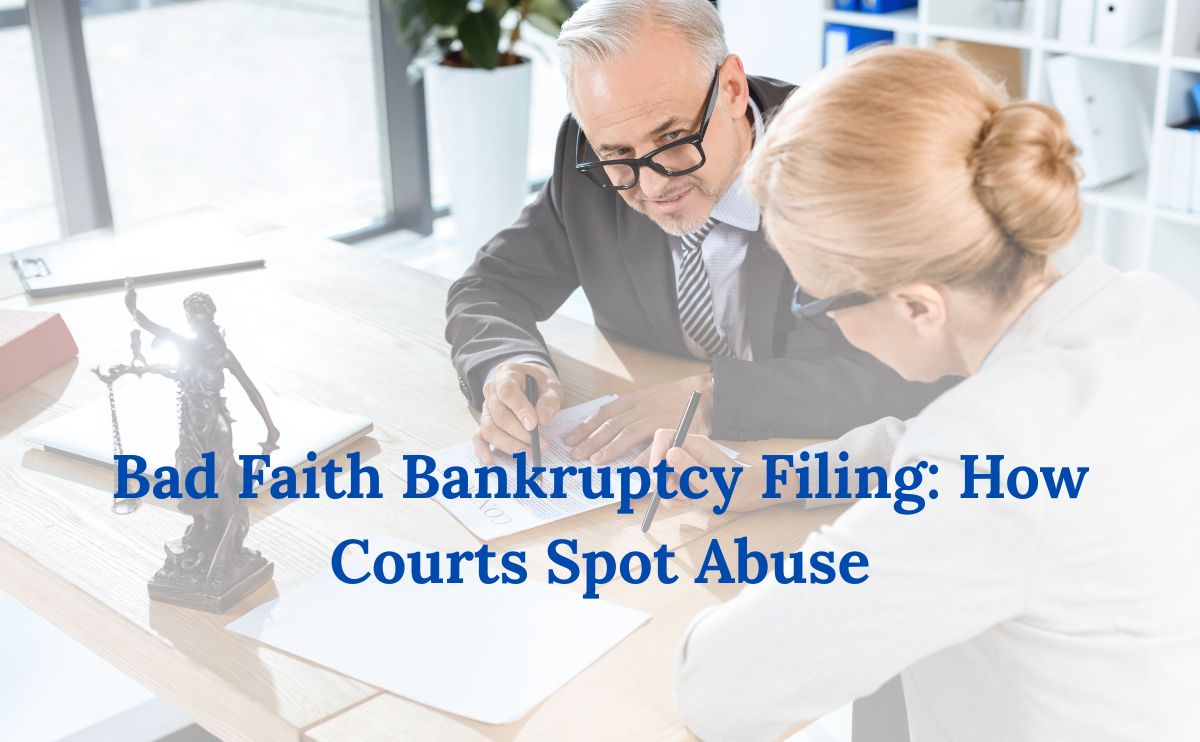Free Consultation
To discuss your financial situation and learn more about your debt relief options, give us a call at (520) 745-4429 or (480) 788-0098.
 Tucson(520) 745-4429
Tucson(520) 745-4429
 Mesa/Phoenix (480) 788-0098
Mesa/Phoenix (480) 788-0098

Is filing for bankruptcy always an honest fresh start, or can it turn into a stall tactic that backfires? Bankruptcy law gives debtors a lifeline, but courts in Arizona keep a close watch for those who misuse the process.
At Yusufov Law Firm PLLC, serving Mesa, Phoenix, and Tucson, we help clients seek relief the proper way while steering clear of costly missteps. In this guide, we explain how judges detect bad-faith filings and what happens when abuse is uncovered.
Bankruptcy exists to help honest debtors wipe the slate clean or to reorganize debt when repayment is possible. A filing made to harass creditors, hide assets, or dodge a single lawsuit without a real plan may cross the line into bad faith. When that happens, judges can dismiss the case and strip away the protection of the automatic stay.
Creditors are not powerless in these situations. If they suspect foul play, they can ask the court to throw the case out or lift the stay so collections resume.
Federal law lets courts dismiss a case “for cause” when the debtor’s conduct shows abuse. Each chapter has its own path to dismissal, but the core idea is the same: good faith is required.
Under 11 U.S.C. § 707(a), a judge can dismiss a Chapter 7 case for cause, and bad faith fits that label even though the statute lists only three sample grounds. The rule applies to both consumer and business cases.
Section 1112(b) permits dismissal of a Chapter 11 case not filed in good faith. Courts rely on this power to prevent Chapter 11 from becoming a litigation weapon.
Indicators of Bad Faith in Bankruptcy Filings
Courts do not rely on one magic factor. Instead, they weigh the “totality of the circumstances” to decide if a debtor crossed the line.
The red flags below often signal abuse:
Any one item can raise eyebrows, yet judges often spot a pattern that seals the outcome.
In Arizona, judges focus on real-world context when it helps shed light on intent. Here are factors drawn from local rulings:
The fallout from an abusive filing is harsh and often swift.
Beyond the legal damage, a bad-faith dismissal hurts credibility with future lenders and courts.
The duty to act honestly does not stop with debtors. Creditors must file claims that reflect real, lawful amounts. Submitting inflated or made-up figures can lead to disallowance of the claim, sanctions, or even prosecution for bankruptcy fraud.
When both sides act in good faith, the process moves faster and costs less for everyone involved.
Filing the right way starts with clear advice. Yusufov Law Firm PLLC helps individuals and businesses throughout Mesa, Phoenix, and Tucson weigh their options, build honest petitions, and respond if a creditor cries foul. You can reach our Tucson office at (520) 745-4429 or our Mesa/Phoenix office at (480) 788-0098. We welcome online inquiries on our Contact Us page.
We focus on solving financial problems, not postponing them. Talk with us to see whether Chapter 7, 11, or 13 fits your goals and meets the court’s good faith standard. Clear guidance today can spare you dismissed cases, lost assets, and fraud allegations tomorrow. Reach out, and let’s chart a lawful path to relief.
To discuss your financial situation and learn more about your debt relief options, give us a call at (520) 745-4429 or (480) 788-0098.
© 2010-2026 Yusufov Law Firm PLLC. All Rights Reserved | Disclaimer | Sitemap |